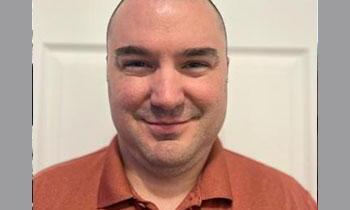
Life has changed a lot for me over the past 28 years of living with type 1 diabetes. Leading up to my diabetes diagnosis at just 12 years old, I remember experiencing some common symptoms including weight loss and extreme thirst. I also dealt with some eye-related issues – severe conjunctivitis and trouble seeing certain colors, such as when my teacher would write in red and green on the whiteboard in school. However, once I was diagnosed and started taking insulin, my eye problems quickly subsided. From then on, I never had to wear glasses or contacts and didn’t experience any eye-related issues – until many years later, when a sneeze would change my life.
In 2021, at 39 years old, I sneezed while reading and suddenly noticed a huge black spot appear in the front of my left eye. After discussing it with my wife, she urged me to go to the eye doctor and get it checked out. The first doctor I went to thought that I might have detached my retina and referred me to a retina specialist. Then, after going through a slew of tests, the retina specialist told me that I had diabetic retinopathy. I thought in that moment, “I’m 39 years old, aren’t I too young to have diabetic retinopathy?” Apparently not.
At that appointment, my doctor told me two things I had to do if I wanted to keep my vision – consistently show up for treatment and keep my A1C levels below 7. My doctor explained to me that if I chose not to manage my health, I wouldn’t need to worry about treatment and I would just go blind. That was the wakeup call I needed to make my diabetes and eye health a real priority! Since then, I have successfully gone through all my treatments and have consistently maintained an A1C level below 7.
One thing I want to say to those who currently live with diabetes or prediabetes is this: I know that management isn’t fun, and it isn’t easy, but you must do it. Do it for yourself, and for those you love. If you really prioritize controlling your diabetes or take the necessary steps to prevent it, in the long term, this will prevent additional complications that you don’t see coming.
These are the personal experiences of individuals living with diabetes and does not constitute medical advice. Please consult with qualified health care professionals to meet your individual health and medical needs.








